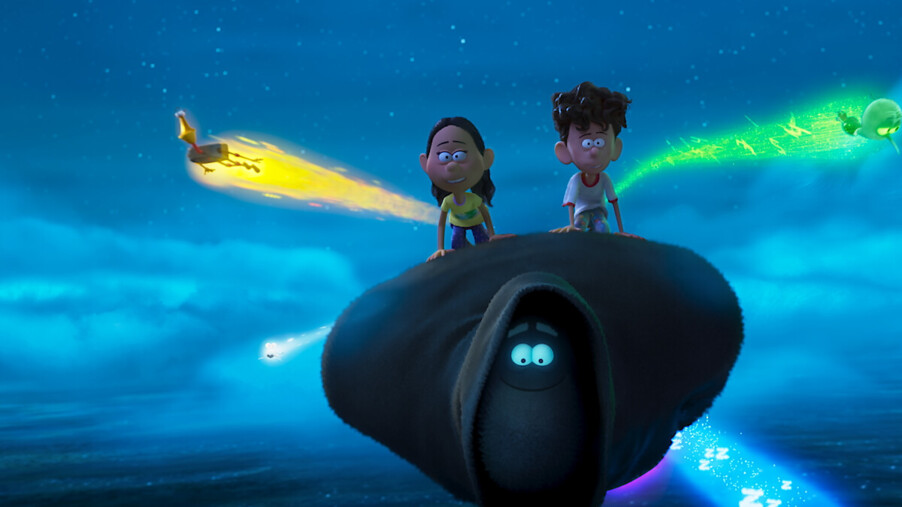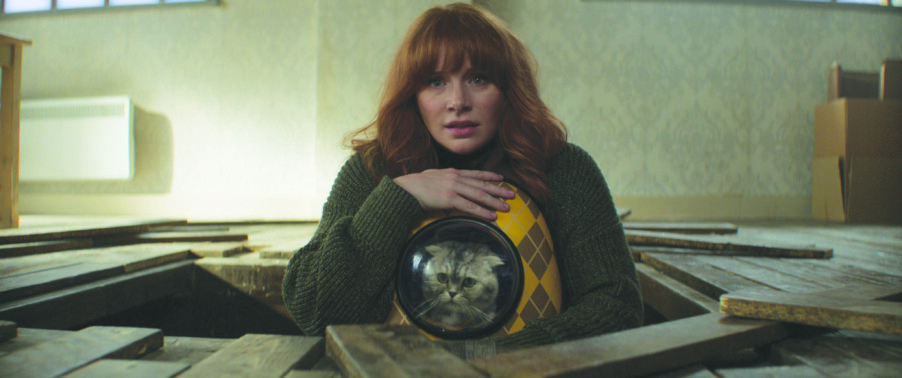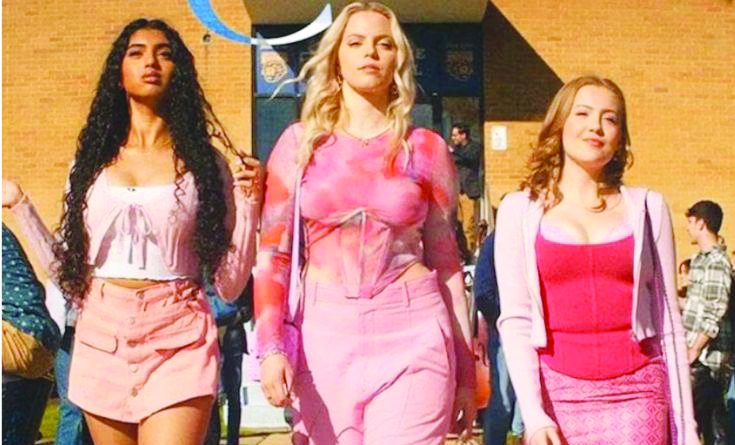Orion and the Dark (TV-Y7)
Voices of Paul Walter Hauser, Jacob Tremblay.
Based on the book of the same name by Emma Yarlett, this animated movie tells the story of Orion (Tremblay), an 11-year-old boy who is afraid of so many things — murder clowns, cell phone radiation, aging planetarium displays, girls, people in general, Sally a girl in his class in particular and especially dark. He plugs in half a dozen night lights and begs his parents to leave the door open but if his room goes dark he screams.
Enough with the screaming, says Dark (voice of Hauser). A large cloaked yet sort of cuddly entity, Dark is tired of being hated by everybody but he is especially tired of hearing Orion yell and scream every night. So he decides that the best way to help Orion conquer his fear of the dark — and of Dark — is to take Orion with him for a 24-hour trip around the world. Dark introduces Orion to other nighttime entities: Insomnia (voice of Nat Faxon), Unexplained Noises (Golda Rosheuvel), Quiet (Aparna Nancheria), Sleep (Natasia Demetriou) and Sweet Dreams (voice of Angela Bassett). Some of their tasks are a little odd — Unexplained Noises decide that a crash with a hint of scraping is what’s needed outside one house — but they are part of the rhythms of life. And they have to keep going so that Light (voice of Ike Barinholtz) doesn’t overtake them. Light would knock Dark out of existence.
As Orion travels with Dark and friends, he slowly and sometimes indirectly overcomes or at least faces a variety of fears. The Dark — like other things in life — can be scary and sometimes we will be afraid but we have to keep going and not let fear itself overtake us, is generally the message here. But the movie makes its points with a swirl of sweetness and cleverness that, in a particularly Charlie Kaufman way (he is the screenwriter), lets the story comment on itself. The result is a story full of fun cartoony kid adventure but nice moments for adults as well. B+ Netflix
Self Reliance (R)
Jake Johnson, Anna Kendrick.
Johnson also wrote and directed this dark comedy. Tommy plays a familiar Johnson character — sort of loveable shell-shocked goober in a life funk. He recently ended a two-decade-plus relationship and now lives with his mom, working a job that appears to barely keep him awake. Walking home from work one day, Tommy sees a limo pull up next to him with Andy Samberg (Andy Samberg) in the back. Andy, reading a script, offers Tommy a chance to compete in a dark web reality show. As he learns when he talks to the show’s creators, all Tommy has to do is stay alive for the next 30 days and he’ll win a million dollars. The catch is that other people — hunters — will be trying to kill him. The loophole is that he can’t be killed if he’s with other people. Tommy decides that not only does the loophole make the game winnable, it might actually be the reason to compete, so he says yes.
He explains to his mother (an excellent Nancy Lenehan, who at one point refers to “Sandy Amberg,” which is maybe my favorite part of the movie), sisters (Mary Holland, Emily Hampshire) and brother-in-law (Daryl L. Johnson) that they will need to trade off being with him around the clock to make it work. His family thinks he’s nuts and says absolutely not, leading Jake to hire a random guy he calls James (Biff Wiff) to follow him around. He also posts a call for someone to hang with on Craigslist — which is how he meets Maddy (Kendrick), who explains she’s also playing the game.
The movie quickly reaches a point of unhingedness when not only the characters, including Tommy, but we in the audience are not sure if Tommy is really competing for a million dollars or if he is in the midst of some kind of serious mental breakdown. It is, at times, unsettling but there is something about Johnson and his particular blend of earnestness, nuttiness, kindness and weirdness that makes it all work more often than not. B- Hulu
The Underdoggs (R)
Snoop Dogg, Tika Sumpter.
In The Mighty Ducks/Bad News Bears fashion, onetime football star Jaycen Jennings (Mr. Dogg) winds up coaching a down at the heels, down on its luck Long Beach kiddie football team. Actually, Jaycen is sentenced to do community service picking up poop at a Long Beach park (after crashing his car into a city bus due to unnecessary rage and some truly terrible driving) but when he sees high school sweetheart Cherise (Sumpter) pick up her young son Tre (Jonigan Booth) from the practice, he takes the advice of old friend Kareem (Mike Epps) to volunteer to coach to pull a Mighty Ducks and woo Cherise. Jaycen is at first just as selfish as a coach as he was as a player but slowly he learns about the beauty of teamwork and to truly root for these kids.
The kids in Underdoggs are young enough that this movie, with some slicing away of R-rated material (a lot of language and also weed talk), would make a fun family film. And really that’s what it should be. There’s only so “R “ you can be in an upbeat sports comedy about a kid team and I don’t think the movie benefits from the R-ness enough to make up for losing its natural family-film audience. As it is the movie feels like a fine-minus version of so many sports movies before it. C+ (the + is in part because it introduced me to the fact that Snoop Dogg actually has long supported a youth football league in the L.A. area and there is apparently a Netflix documentary series about it called Coach Snoop) Prime Video
Role Play (R)
Kaley Cuoco, David Oyelowo.
David (Oyelowo) and Emma (Cuoco) have a nice life with two children — Wyatt (Regan Bryan-Gudgeon) and Caroline (Lucia Aliu) — and a suburban house and a marriage that seems solid if a bit flat due to usual work-life balance stuff. Emma returns exhausted from a work trip to realize that the fancy dinner her husband has arranged is in celebration of their anniversary — which she completely forgot about. To spice things up they decide to head into the city and spend a night at a hotel — after first “meeting” in the bar playing the roles of new people, with the flirting etc.
Actually, inventing new identities is easier for Emma than David realizes. Her “work trip” wasn’t to the Midwest to talk to corporate middle managers. She went abroad to do a little light murdering. She works as an assassin, taking a contract or two every few weeks to help pay Raj (Rudi Dharmalingam), her handler who helps keep her image scrubbed from the internet and just generally keep her off the radar of Sovereign, the international assassination concern she used to work for before giving it all up for David and family life.
Before the couple can do their little sexy role play at the bar, Bob (Bill Nighy) buys Emma a drink and comes over to hit on her, drunken businessman style. Except not really, which Emma realizes. Eventually, Emma and David — pretending to be Alice and “Jack Dawson,” because David is bad at fake names — shoo Bob away and have their fancy meal. Later, when David falls asleep in their room, Emma goes to find Bob to deal with him, which doesn’t go as cleanly as she hopes. Soon there is police involvement and Emma is exposed for the secret assassin she really is. David isn’t sure what he believes, but he’s not entirely ready to turn his wife in to Gwen Carver (Connie Nielsen), the woman investigating Emma, who is really named Anna.
Not long ago, Mark Wahlberg starred in a similar super-assassin-turned-family-guy movie The Family Plan. That movie wasn’t great, but it had a more consistently comic tone. Role Play can’t quite decide if it is an action comedy or something darker, a drama with occasional comic hints but also kids in peril. Oyelowo seems to think he is in a comedy, Cuoco seems to think she’s in the darker thing. The actors are engaging enough together but they often seem like they’re operating on different frequencies. C+ Prime Video
Featured photo: Orion and the dark.










